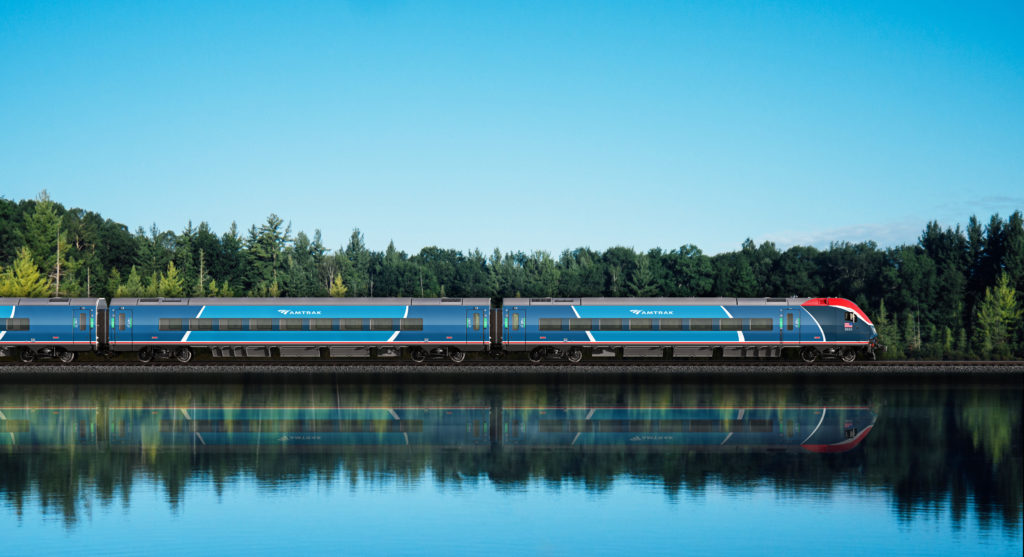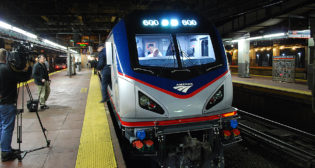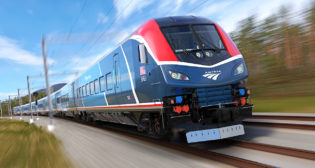
OIG Releases Audit Report on Amtrak Intercity Trainset Program
Written by Marybeth Luczak, Executive Editor
Amtrak Airo™ trainset with Coach/Cab Car. (Photograph Courtesy of Amtrak)
Amtrak experienced early challenges with stakeholder communications in its intercity trainset acquisition and maintenance facility modification work, leading to scope changes, cost increases and schedule delays, according to a new report from the Amtrak Office of Inspector General (OIG).
Amtrak in 2021 awarded Siemens Mobility $3.4 billion in contracts to design, manufacture and provide technical support services and maintenance for 83 trainsets, of three power configurations, with options for up to 130 additional trainsets. Amtrak’s total investment, with a long-term parts supply and service agreement, facility modifications and upgrades, and contingencies, is $7.3 billion. A share of the railroad’s Infrastructure Investment and Jobs Act (IIJA) funding will support the procurement. The new trainsets, scheduled to be delivered from 2025 through 2031, will replace Amtrak’s aging fleet of 458 individual Amfleet I cars and 17 Metroliner cars, which operate primarily on the Northeast Corridor, along with its fleet of Talgo trainsets operating on the Cascades service in the Pacific Northwest. Amtrak earlier this month released visuals of its upcoming new Siemens-built long-distance and corridor service single-level, semi-permanently-coupled push/pull trainsets—called Amtrak Airo™.
“The Intercity Trainset (ICT) program is the largest acquisition of passenger rail equipment in company history,” according to the OIG, which on Dec. 27 released its audit report (download below). Amtrak “expects the new trainsets to increase reliability, efficiency and on-time performance; it also anticipates using them as part of its effort to expand passenger rail service to as many as 160 new communities in 16 new states. As part of the ICT program, the company also plans to construct or modify 21 maintenance facilities to accommodate these longer trainsets.”
The OIG said the objective of its audit report was to assess Amtrak’s oversight of the ICT program, “[g]iven the high-risk nature of this program and the company’s past challenges in managing major acquisitions—as well as the operational and reputational risks of not meeting the program’s budget and schedule goals. …” The December report, OIG said, is the first in a series over the life of the ICT program.
The OIG’s work largely focused on the trainset acquisition and the maintenance facility modifications “because they are two of the costliest and most critical components of the ICT program.” To identify risks, the Office interviewed key program officials, reviewed program documents, and visited the service and inspection maintenance facilities in Philadelphia, Pa.; Washington, D.C.; and New York City. It also visited Siemens’ Sacramento, Calif., manufacturing facility, and observed production processes and interviewed Siemens officials assigned to the program.
Among the OIG’s audit report findings:
- Amtrak waited until three months after signing the Intercity Trainset contract with Siemens before its food and beverage personnel reviewed the design of the planned food service car, according to the OIG. They found that the initial design for the car lacked the necessary food storage space to accommodate longer trips and required additional space for customers to stand and move through the galley car. As a result, Amtrak initiated a change order to redesign the café car, which increased program costs by $42.5 million and will delay the delivery of the first trainsets by five-and-a-half months, the OIG reported.
- Amtrak did not engage with key personnel at the maintenance facilities that will accommodate the new trainsets as it developed their designs, according to the OIG. For example, in February 2022, program officials visited the Seattle maintenance facility to verify the preliminary design, but onsite personnel identified a design element that would have negatively impacted maintenance and commuter train operations in the yard, which resulted in another design change, the OIG reported. Amtrak paused all maintenance facility design activities in spring 2022 to conduct stakeholder workshops at each of the 21 facilities it planned to modify as part of the Intercity Trainset program, according to the OIG, which noted that any additional design changes resulting from the workshops could delay construction by 10 to 13 months.
“Amtrak identified these challenges and began addressing them,” according to the OIG. “It has also since established a program management framework that closely aligns with company and industry standards, including adding cost, risk and change management controls.” OIG noted that the Capital Delivery department “is in the process of identifying any controls needed to manage its major capital programs, but it has not yet established and implemented a control to require stakeholder input on all major programs going forward.”
To continue improving oversight of major capital programs, OIG recommended that Amtrak “[e]stablish and implement controls for program personnel to identify and engage all relevant stakeholders, including business end-users, to specify requirements early for all major capital programs, and to modify those requirements as program needs and assumptions evolve.”
OIG reported that Amtrak management agreed with the recommendation and “provided a draft outline of a project development process that it believes will facilitate the company’s ability to identify and engage stakeholders throughout a project’s lifecycle. Management also stated that the ICT program team will apply this process on future projects. The target completion date is November 30, 2023.”



